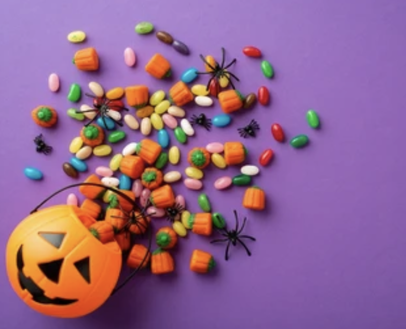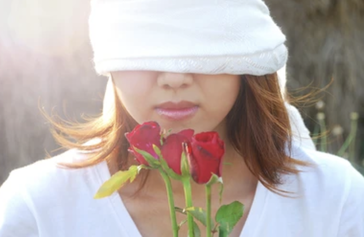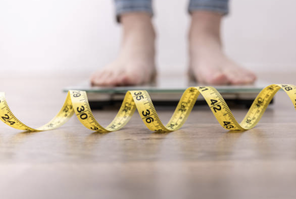 Happy Halloween 2023! First off - be safe. Read my articles on how to protect your while having fun this Halloween. Second - the big question - is halloween candy bad? Should I limit my child's Halloween candy consumption. This is tricky - understandable you don't want your children to eat three million pieces of candy over the course of three days and get sick. I get it. But you also need to be aware of how limiting children impacts their relationship with food. Here are some quick tips on some things you can do to keep healthy boundaries while also allowing kiddos to enjoy the holiday! 1. Have healthy boundaries around candy - do not try to eliminate the candy all together. This will really reinforce problematic relationships with foods. Boundaries are OK! Maybe saying okay let's have a few pieces a day (without be so specific or overly rigid). It's also OK for them to eat too much candy a feel a little full. They will survive and next time they probably will eat a little less. That creates an intuitive relationship with food! Kids who are used to extreme rigid boundaries around candy are usually the ones who go overboard when they see it. 2. Do NOT label foods as good or bad! Labeling foods as good or bad, healthy or unhealthy is a sure way to really mess with the natural food intuitive relationship. Stay away from strong labels around food. When 'all foods fit' it actually really allows us to regulate ourselves and we will find a natural balance of candy and vegetables! 3. Do NOT use candy as a reward! Stay away from 'earning' the candy at the end of a certain tasks. Rewards are great for kids -but food rewards are tricky. You want to keep food about food; not about good or bad or earning something. Trust me! Find other rewards for positive daily behaviors other than food. 4. Enjoy the moment with your kiddos! The cute costumes, excitement for life and running around the neighborhood can be so fun. Remember to enjoy that moment as they go by too quickly. Don't worry so much about the candy. Happy Halloween folks! Be safe! Dr. Kelsey :)
0 Comments
 How do clinicians define psychological projection? Projection is defense mechanism, and defense mechanisms are ways a person protects themselves form things that they are possibly unready to hear or manage. That means that these defenses are out of the awareness of the individual. Projection is when we take feelings that we might not want to acknowledge in ourselves, such as jealously or anger and we "project" them onto someone else. Think about what a projector does - it takes an image in a movie theater and places it on the screen so you can see it. The image is not coming from the place we seen it (ie - the screen), it's actually coming from the lens of the projector onto the screen. This is the same thing here. What causes it? The person sees parts of themselves in others that they cannot stand in themselves. They may be overly upset when they see someone who might be showing jealousy or anger, when in fact they too may feel those same things. For whatever reason, the person has sort of cut this part off, and potentially placed it in the "shadow self" (another trending term) but this part of them is not gone - it's now taking the wheel when they are unaware and creating reactions that might cause them issues in relationships. Are there signs or symptoms? I think signs to look further into are "triggers," meaning when your emotions escalate extremely quickly in response to someone you might not know well or haven't reacted to in that manner prior. This is an indication to take a step back and ask what might be deeper here. How does it affect your mental/emotional health and physical health? This defense mechanism is normal to an extent in all of us and therefore it might not affect you at all, other than random fights with friends or your partner. However, for others it is a totally different story. This might lead to cutting off relationships, dramatic fights and feeling out of control with emotions. This is when you really need help sorting things out. How can you stop if you recognize the behavior in yourself? As noted above, this is extremely hard to do on one's own because it is often out of one's awareness. You need help exploring this and that can be done in individual and group therapy. What should you do if someone is projecting on you? Apologize if you have something to apologize for - that's an important quality for anyone to have! However, be careful to over-apologize for things you know you have not done. Instead maybe express concern for the person and let them know you really have not intended to do what you are being accused of and that you are willing to hear them out, but you do not believe you have actually acted in such a manner so you want to be heard too. At the same time, it is important to have boundaries for yourself and not just accept projections of others as this can be dangerous.  I frequently work with the teens and young adults in the college age that deal with the outcomes of drinking too much. The stories are extremely upsetting and the costs can be more than a bad morning with a handover. I have seen drinking games and binge drinking episodes lead to experiences of sexual assault (never means the victim is to blame - you aren't!), alcohol poisoning and failing out of school or losing one's job. For some individuals, the partying turns excessive and becomes more about having to drinking than even wanting to. It changes the brain over time and can impact other mental health disorders, such as intensifying depression, anxiety and suicidal thinking. Often it can be paired with an eating disorder as well. My immediate tips as we move into the holiday times where everything is about excess is to do the following. 1. PLAN for your safety - If you are a young adult going out, do everything you can to increase the safety around drinking. This includes having a sober driver either in your group or a plan ahead of time of how you will get to/home from the party. Be extremely careful about shared ride experiences, as these are not always going to guarantee your safety. If you choose to take those rides, never ride alone. Have someone with you and remain awake and alert in those rides, know where the safety button is on your phone to alert the shared ride carrier if you are unsafe in the vehicle (these exist adn are extremely helpful!). Check the license plate and driver before you enter into the car. There have been numerous times in the past where the worst has happened because someone was not alert and went into the wrong car. It is safest to have a sober-sister or friend that will agree to ensure that the entire group is safe and accounted for both in ride and in number. This person will remain alert and aware of where everyone is and that no one is leaving the crowd. 2. Monitor your drinking - Make a plan before hand of how much you will drink. This may sound funny, but it's important for many people. The reason for this is that many of us when nervous may just sit and sip to decrease the social anxiety. This can lead to losing track of your consumption quickly. In addition, choose drinks that allow you to know how much alcohol is in it. That means staying away from the "unknown punch." Watch your drink being made and never, ever leave your drink unattended. I have come across many sad stories of people's drinks being spiked without their knowledge. It is also incredibly important to eat normally throughout the day and snack while drinking as well. College age people will frequently have the "drink your dinner" mentality and again, this can lead to bad things happening. You will be impacted by the same drink much more when you are not eating throughout the day. 3. Get help! If you notice you're doing these things and your friends can stop drinking or not think about it until the weekend and you can't - then you might have a problem. There's nothing to be ashamed about. There are many people who suffer from addiction. The earlier you get help the better. Addiction is a progressive disease and will take more and more over time.  I recently spoke to Yahoo News regarding the reality TV craze of Love Is Blind. Here's the extended interview you didn't get to see. Is love really blind? What were your thoughts on this season? This season showed many issues and dynamics that can occur in relationships that we all experience and reality television can be used to either mindlessly "tune out" from one's life or to actually "tune in" and become aware of how we relate in our own lives. There are always I few things I strongly push in understanding these shows. In reality television shows, often the casting is geared toward trying to pull for those dynamics as the audience generally is more engaged with high intensity interactions. In addition, even if the taping of the shows are done in a fair way, the editing team may be completely separate and showing us only the parts of the recordings that support the storyline they are interested in portraying. It is always important to keep that in mind when watching these shows and to remember that any one of us could appear to be a 'certain type of person' if our lives were filled and boiled down into an hour show. I saw this because I saw many people online making snap judgements about these people's overall character, saying Lydia was a 'stalker' and JP is an 'abuser,' etc. We have to remember these are people not characters and in their lives, there is likely far more to them than the pieces of film we saw. I always try to remember that when watching these shows. Here's a few specifics I took away:
It's important to remember it is an experiment. They note this multiple times throughout the show and the cast members also state this. Can it work? Sure it can - but on a mass scale? My answer as a psychologist to that is likely no. We have to remember that the people who even apply to be on the show are likely 'romantics' in their personality style - they believe from the start this could work and that's powerful! I am not that way and would not ever consider applying to a show like this. So the pool of candidates here is biased since they have a "placebo effect" of believing it could work to begin with. Having said this, there are some wonderful aspects to the show. In the real world, we start often with the physical chemistry that pulls us together (passionate fatuous love), and then we move to developing a deeper bond on our values (romantic love) and eventually we commit to a long-term bond with this person (companionate love). On this show, the script is flipped to first focusing on teh deep bond and romance, then adding in and determining fi there is passion to back the values bond, and then finally whether the commitment is going to be made. It is a TON of pressure on these young people to make over a very short period of time. Most couples average over 2 years before they consider marriage and these folks are making lifelong decisions in 4 weeks. It's admirable they would even consider that possible and for many couples, they are still together! And, given that so many people watch the show, I think it speaks to the 'romantic' that lies in each of us that the fairytale is possible and we could be loved for who we are. In a true healthy relationship, that is what holds people together and true love is blind, but it is also okay for love to have physical chemistry and a passion on the outside too!  OK parents, I feel for you on this one. Your adorable little child that used to want to know what you thought the best costume was, used to have you help them getting ready to go out and collect giant heaps of candy. They were adorable little ghosts, superheroes or cartoon characters. Suddenly, they are teens and everything has changed. If you haven't already had to have this convo, it might be one you will someday. I was recently asked to contribute Parents Magazine about teens wanting sexy halloween costumes and how to manage these conversations. The article is fantastic and I highly recommend you read it fully. Below is my expanded thoughts on the topic. What if I totally disagree with a sexy halloween costume??? I think in today's times this is an awesome opportunity to have a loving and open conversation with your teens that provides a sense of you aligning with them and supporting them for the remainder of their teen years into adulthood. If you see them wanting to get one of those costumes and you disagree as a parent, first i would probably validate their feelings. Remember the old movie Mean Girls and the halloween party scene? This has been a thing for a long time and there's nothing to be ashamed of. I would encourage your teen to talk about why they want to wear a certain costume and what they are hoping to get from it. You might find them opening up deep concerns of not feeling good enough, or needing validation of worth from others, or just a sense of fitting in. Those are all very important things and normal things teens want to feel. Hopefully, you have laid the foundation of other times you have talked about self-esteem and validation. So what does a parent actually do?! You can then validate their feelings and say "of course those things are normal, and I totally wanted the same thing when I was your age." You can ask them what else they might communicating to others by wearing a particular outfit - I don't mean to send a message that a flirtatious costume means a person is asking for something bad to happen because that is not correct. What I do mean is that we might be sending a message that we are looking for external attention in a negative place and is that the message your teen wants to be sending. The key here is creating curiosity and openness, not shame for wanting attention or for showing one's body. WHat are other messages do they want to send into the world about themselves and their personalities - is it that they are fun? Creative? Exciting? What about using the Halloween holiday as a time to express those things and to enjoy being a teen. I think the main things here are to really lean in with understanding and to connect with your teen during these challenging times of wanting to fit in. Tell them you really do support them and that's why you want them to be able to enjoy this time in their lives of fun and freedom, as there is time to make more grown up decisions about how they feel about these same things in the future. If they want to still dress in a particular costume when they are no longer a child, then that is their ability to do so and you will support their adult choices at that time because they will be equipped emotionally to see the whole picture. Ensure that any choices you make as a parent are to provide them with safety and ability to have a live a life of freedom, not emprisonment, since that is what teens may think the motivation is. Let them know it is your job as a parent to help them reinforce healthy boundaries until they are ready to take the reins when they are adults. Your teen might hate you until they are 25 (kidding, not kidding!), but eventually they'll probably understand you were trying to protect them until they are adults who can make healthy decisions for themselves. indoor dating is the new thing... I was recently asked to contribute to Women's Health on indoor dating ideas - a particularly important topic since the pandemic times developed. Here were some of my deep thoughts on the topic expanding on what is quoted in the article! I hope it helps some couples looking to rekindle their relationship in a different way! -Why are date nights important? Very important topic to discuss. It is less about the specifics of what you do on date night but rather just actually making date nights a priority. Why? Well, this communities to your partner that you care and you are prioritizing your relationship. It is so easy to get caught in the rut of the same ol', same ol' and this can lead to a fizzling of the passion you once had. I also understand how difficult it can be to prioritize your relationship when everything else feels like a priority too - the kids, work, and even sleep! It's very easy to push the relationship to the side and that is how we unfortunately can grow apart over time. -How can you make indoor date nights romantic? Anything can be a great indoor date! A bottle of wine and a beautiful dinner at the dinner table (not while sitting on the couch!). I have heard of others actually doing indoor picnics or just something simple like a movie date. I think the key is that is does not need to be over-the-top. It is about setting aside that time for your partner and only your partner. So, set the kids up with a babysitter and put your computer aside and silence the phone. Take a couple of hours for just you and your partner. That is romantic. Maybe think about what used to come naturally to you at the beginning of your relationship and do that. What did you used to do to make the person feel special? Candles? Flowers? A lovely card? All of those things go a long way. -What are some indoor date ideas that people in relationships can try?
As noted above, if romance is needed, put the technology away and cook a nice dinner, set the candles and turn off the television. Ask one another questions you used to ask when you wanted to get to know someone. And most importantly - listen and be present. It does not take a lot of money to be romantic. You can do it on any budget - most of the time what creates romance is mindfully tuning into the other person and being present. In our culture, we often are present in body but not mind. Give it a go once a week or once a month and see what happens to your experience of your partner!  SLEEPWALKING SLEEPWALKING I was recently invited to speak to Fox News about sleepwalking from a psychological perspective. Here were my extended thoughts on the issue. We should take any sleepwalking signs seriously and always speak to a provider if we suspect sleepwalking is present! What is sleepwalking? I have worked with clients with all sorts of issues, including sleep problems for over a decade. I always partner with medical professionals when this is something a client reports because it could point to a variety of different things that might be happening. A person might have a sleep disorder in which their brain is essentially still 'asleep' while their body is 'up and awake.' This is a terribly frightening thing for many people to experience, as I have seen folks who have woken up with bags of open chips around them and not remembering engaging in night-eating. I have also had clients who have made large purchases or sent texts they do not remember and these things can have negative impacts on their lives. From a psychological point of view, it can create a sense of lacking control and lacking trust in themselves as anyone could imagine. what causes sleepwalking? Sleepwalking can be caused by a variety of things. Sometimes a person may be taking a sleeping medication that may be associated with such things as a potential side effect. In this case, if they experience sleep walking, driving, or other actions after trying a new medication they need to immediately inform their provider, as their provider may want to shift the medication or provide additional personalized recommendations. For other people, they may have sleepwalking as a primary issue that is not a side effect of a medication. Often, sleeping issues are 'brushed off' by clients and they are not very specific with medical providers on their symptoms. It is really important to have a sleep diary that you are using to write down everything you are doing around your sleep and symptoms you experienced each night so that when you speak to a provider, they are fully aware of what the entire clinical picture is; it is also important to pair your work with a therapist who can help you manage some of the psychological factors underlying your sleep disorder - as there could be PTSD, depression, anxiety, eating disorders or other diagnoses that could actually be the primary issue and the sleep disorder may be a 'side effect' of the untreated psychological issue. Having a full team in collaboration with one another is key to get the best overall treatment. how someone can know if they're a sleepwalker, when to see a doctor, and any safety tips regarding sleepwalking? ISometimes people find out they are sleepwalking because others around them close to them may be the ones seeing it. Listen to them and take it seriously if a partner tells you they saw odd sleep activity or a friend tells you that you called in the middle of the night and you don't remember it. As noted before, I have seen clients wake up with wrappers around them and having no memory of eating in the night or seeing that they charged their credit card without memory. This is serious stuff and it should always be taken seriously because sleepwalking can have dangerous psychological and physical impacts. I always tell my clients to immediately let their providers know what is happening and to ask their provider if a sleep study is appropriate. Sleep studies are excellent ways to have a team of sleep experts monitor a person's sleep and to see what is actually happening. Often it provides information that cannot be found elsewhere and most people do not know those services exist. Examples of emotional contagion. Emotional contagion is a real thing and it can be dangerous. This is what is associated with the concept 'group think,' which is a phenomenon where we engage in group activity that we would not engage in ourselves. This type of mentality can lead to dangerous outcomes, including riots and other harmful behaviors. In emotional contagion, the person loses sight of their own thoughts and feelings and goes along with the experience of the crowd. This type of phenomenon has been known to psychologists and sociologists for decades, and sociologists generally study this given that they focus on group interactions.
How can you avoid 'emotional contagion'? If you find yourself getting sucked into the feelings and thoughts of others on a regular basis, and changing deep things like values based on others ideas then it's important to take a step back. You may be vulnerable to emotional contagion. We encourage 'reality checking' with people you trust and always seeking professional consult when an issue is bigger than yourself. Many times, when this type of a thing is a challenge for someone, they need a professional to help them figure out what is underneath. On the other hand, any of us can get sucked into 'group think,' so if something does not feel right, don't do it. Remember that the science shows that it is indeed easier to lose yourself and who you are in a pack mentality. Did you know that this week 10/8/15-10/15-23 is OCD Awareness Week 2023? Well it is! Obsessive Compulsive Disorder (OCD) is a highly misunderstood disorder and usually people think it means a very clean person who is worried about germs and washes their hands too much. That is only one small picture of OCD symptoms that falls under 'contamination OCD' subtype. There are many types of OCD - concerns about germs on one hand to hoarding on the other. They are all faces of OCD that all have equally devastating effects in the person's life over time.
What causes OCD? OCD is a devastating mental health issue and I've heard people misuse the term "I'm so OCD" or "I wish I had OCD" due to not understanding what it really is- please understand this is a serious and devastating disorder. It is not about cleanliness, germs or hoarding - for some that may be a focus of their disorder but these are only symptoms of OCD. People who have OCD have both obsessions (cycling thoughts and fears) and compulsions (things they do to alleviate the obsessional thoughts) and this becomes a cycling highly reinforced brain pattern that gets stronger over time. The underlying fears of what could happen are alleviated by the compulsions for even a moment in their mind so that can produce more and more avoidance of the fear. Do I have OCD? Well, again - it's not just that you're clean or care about germs. People with OCD are suffering - often OCD symptoms can progress to a way that affects their ability to interact in life, work and family. It can also overlap with many other disorders, including substance use to numb the fears, eating disorders due to the obsessional patterns and depression/anxiety. Sometimes suicide. OCD treatment - is it possible to get better? It is incredibly important to receive help and the treatment is exposure with response prevention (ERP), often combined with medications to help regulate the brain. ERP for OCD is an evidence-based approach where you face the thing you fear without using your compulsion. This type of work is very hard and often a 'slow and steady' approach is key with a hierarchical progression to conquer the fears and underlying anxiety. Bottom line - there is help and people deserve to get better so find someone you trust and start to take the steps to a better life because you matter, you deserve, and you're good enough. |
OPEN DISCUSSION REGARDING TODAY'S HOT TOPICS!Dr. Kelsey explores the actual science behind today's "hot topics". She also explores deep dive behind some of her featured media topics. Come aboard to see the simple solutions to complex problems! Categories
All
Archives
December 2023
|
Location:
|
Say Hello to our team! |


 RSS Feed
RSS Feed